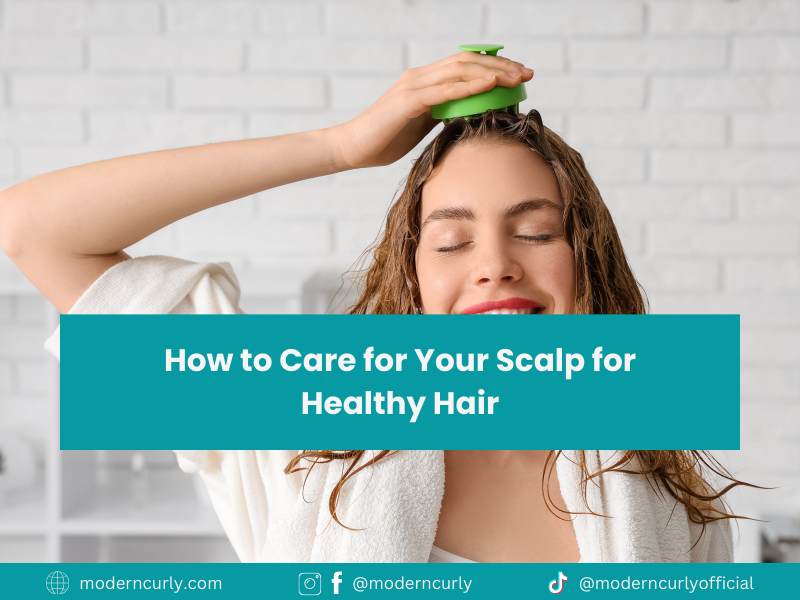Healthy hair starts from a healthy scalp. The scalp is the foundation of the hair. Imagine a plant that has good media, then the plant will grow healthily. Not only as a medium to support, but as a medium to absorb the nutrients provided. The same is true with your hair, if your scalp is problematic or unhealthy and cannot be a good medium for hair, it will definitely be difficult for hair to grow healthily.
What are the signs of an unhealthy scalp?
Having beautiful and healthy hair is everyone’s dream, both women and men. However, usually the problems that occur with hair are usually caused by a problematic scalp. To have beautiful hair, you must not forget to take care of your scalp to keep it healthy.
Before knowing the tips for caring for your scalp for healthy hair, let’s first recognize the signs of a problematic scalp!
1. Dandruff
One sign of an unhealthy scalp is dandruff. Dandruff is caused by excess oil on the scalp, which can be an ideal environment for the growth of Malassezia fungus. This fungus causes inflammation of the scalp, triggering the production of dead skin cells that then appear as white flakes on the hair. Dandruff is the most common scalp problem, to the point that many shampoo products have special variants for dandruff scalps.
2. Dry Scalp
Dry scalp occurs due to lack of natural moisture needed to maintain a healthy scalp. Symptoms that appear can be dry, scaly, and sometimes itchy. This condition can be caused by environmental factors, use of inappropriate hair care products, or lack of nutrition.
3. Hair Loss
If your hair is falling out badly, it means that your scalp is having problems. Hair loss is caused by scalp problems, such as excess oil or dryness, scalp health problems such as dermatitis, or hormonal imbalances.
4. Psoriasis
Psoriasis is one of the signs that your scalp is unhealthy. Scalp psoriasis is a skin condition caused by a malfunctioning immune system, causing skin cells to grow too quickly. Symptoms of scalp psoriasis include dry, scaly scalp, the appearance of red, sometimes thick patches, and flaking that resembles dandruff. The condition can also cause a dry, cracked, and bleeding scalp.
5. Bad smell
Have you ever felt an unpleasant odor from your scalp, whether from yourself or someone else? If so, it could be a sign that your scalp is experiencing problems. An unpleasant odor can appear as a result of various conditions, such as excess moisture, fungal growth, or an imbalance of bacteria on the scalp.
6. Scalp infection
A scalp infection can occur when fungus or bacteria enter through the hair follicles, damage the scalp, and cause symptoms that can be very disturbing. Symptoms can include blisters, redness, and even pus, and sometimes a burning sensation around the infected area.
Read Also: Other Common Hair Problems That Affect Women Worlwide, P.S It’s Scary!
How to Care for Your Scalp for Healthy Hair
A well-groomed scalp is certainly the root of beautiful hair. Having a healthy scalp is certainly a source of pride for many people. For those of you who want to care for your scalp to avoid various hair problems above, follow the tips on how to care for your scalp below and say welcome to your healthy hair!
1. Don’t wash your hair too often
Some people think that washing your hair every day can clean your scalp from dirt, this is not entirely wrong but it is not recommended. Shampooing can also remove the natural moisture from your scalp. The dirt and oil that is removed when washing your hair involves removing the natural oils that protect the scalp from drying out. When this moisture is lost, the scalp tends to become dry and less comfortable.
2. Using the Right Hair Care Products
There are many hair care products on the market, but it turns out that not all hair care products are suitable for you. For a healthy scalp, you should use hair care products that are gentle or soft in formula. Avoid using products that contain harsh ingredients, such as sulfates and other aggressive chemicals, because they can cause irritation and dryness to the scalp. Instead, pay attention to the contents of the product and choose one that contains natural ingredients and is specifically designed to treat the scalp gently.
3. Avoid Products Containing Silicone
The next scalp care tip is to avoid using hair care products that contain silicone. Silicone does have various benefits for hair such as giving shine and making hair easy to comb, but excessive use can cause problems with the scalp.
Silicone tends to form a thin layer on the hair, which can cause buildup and is difficult to wash off. Silicone that continues to accumulate on the hair can inhibit air circulation in the scalp, increasing the risk of dandruff, itching, and scalp irritation. In addition, silicone can also clog the pores of the scalp, inhibit the production of natural oils, and make the scalp dry.
4. Deep Conditioning
Deep conditioning is an intensive treatment method that uses specially formulated products to provide extra moisture and repair to dry or damaged hair. The deep conditioning process involves using a conditioner or hair mask that is left on the hair for a certain period of time, usually longer than regular conditioner.
These products can contain ingredients such as natural oils, proteins, vitamins, and other active ingredients that help moisturize, rejuvenate, and strengthen the hair structure. Not only can it make your scalp healthy, by doing deep conditioning regularly, you can also reduce hair damage, and improve hair texture and shine.

5. Massage with Natural Oils
Massaging your scalp will improve blood flow and maintain a healthy scalp. Use natural oils such as olive oil, coconut oil or grapeseed oil. You can mix it with fragrance oil if you want a scent that you like. It is important to regulate the frequency of massaging your scalp, because doing it too often can make your scalp over-oiled and can disrupt the balance of moisture on your scalp.

6. Protect from Hot Weather
For those of you who often do activities outside under hot weather, don’t forget to protect your scalp. Use an umbrella, scarf or hat to protect your scalp from hot and dry weather that will interfere with scalp health. Protect your scalp with a hat or head covering that is not too tight so that your hair can still breathe. In addition to looking more stylish, your scalp is also protected.

7. Drink enough water
Who is still lazy to drink water? From now on, try to consume at least 2 liters of water a day. The importance of drinking enough water is not only beneficial for the body as a whole, but also plays a crucial role in maintaining a healthy scalp. A poorly hydrated scalp can cause problems such as dandruff, itching, and cracked scalp. By maintaining adequate hydration from within, we provide natural protection to the scalp, keeping it soft, healthy, and free from annoying problems.

8. Avoid Scratching
For those of you who have a habit of scratching your scalp, it’s better to stop if you want to have a healthy scalp. Scratching your scalp can cause irritation and damage to the scalp, which can ultimately affect hair health. This habit is often done unconsciously, especially when the scalp feels dry or itchy. However, keep in mind that scratching can damage the protective layer of the scalp and cause abrasions, infections, or even hair loss.
Instead, gently clean your scalp with your fingertips while washing your hair. This not only helps remove dirt and excess oil, but also improves blood circulation, supports healthy hair growth, and reduces the risk of scalp problems.

9. Use Antibacterial Oil or Soothing Oil
If your scalp feels dry and itchy, you can use antibacterial or soothing oil to eliminate that one problem. Both have properties to relieve irritation and provide moisture to dry scalp. Antibacterial oils such as tea tree oil or lavender oil can help overcome inflammation problems on the scalp, while soothing oils such as coconut oil and almond oil function to moisturize your scalp.

10. Nutritious Food
Having a healthy scalp can not only be done with external care. You also have to start maintaining a diet and consuming nutritious foods. Start consuming foods rich in antioxidants to increase metabolism and blood circulation to maintain the health of your scalp. Internal care is usually more effective in the longer term. You may not feel the effects immediately, but with consistency you will definitely feel the difference.

11. Managing Stress
The last way to care for your scalp is to manage excessive stress. Stressful conditions can trigger various scalp problems, such as dandruff, itching, or even baldness.
Managing stress well can help maintain healthy scalp and hair. Try to find relaxing activities, such as meditation, exercise, or fun hobbies. It’s best to find positive activities through hobbies or exercise to keep your mind calm and don’t forget to pay attention to balanced nutrition. Balanced nutrition is also useful for controlling hormones in the body.

Those are some ways to care for your scalp for healthier hair. Taking care of your scalp not only benefits yourself, but also creates a more comfortable environment for those around you. A healthy scalp not only makes you feel better, but also affects how others see and feel about your presence.
On the other hand, a problematic scalp, such as dandruff or dry scalp, can create discomfort both physically and psychologically. Itching or other scalp problems often interfere with a person’s comfort in carrying out daily activities. Therefore, taking care of your scalp is not only about appearance, but also about well-being and self-confidence.

